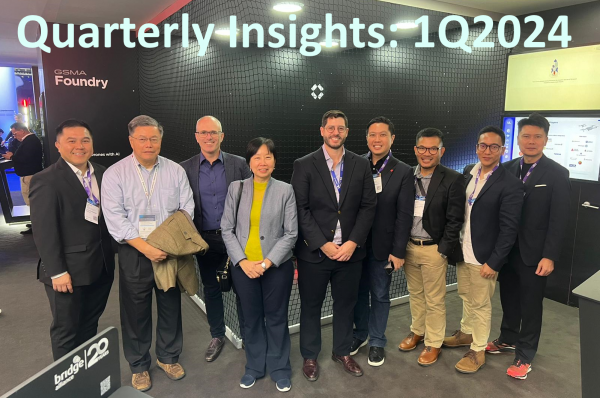
Bridge Alliance and BMO management at Mobile World Congress 2024 in Barcelona.
Hi everyone!
Welcome to the 1Q2024 edition of quarterly updates from Bridge Alliance and Bridge member operators.
Evidently March does not go by in the mobile industry without the frenzy of Mobile World Congress (MWC) Barcelona, where ‘Generative AI’ (‘#GenAI’) was the buzzword that played out in full this year, together with its potential in use cases like chatbots for consumer support, image creation, content creation and workforce training. Network innovation and the use of AI in network management was also a big topic. AI presents an opportunity for telcos to start monetising their network, such as utilising applications, computer vision and holographics for traffic optimization.
Telco APIs, Bridge Alliance’s latest and newest business core pillar, was a big topic at MWC 2023 among mobile operators . Operators devoted a lot of time and booth space to demonstrating their Open Gateway API implementations, showcasing interesting demos and use cases. We too had a showcase at the GSMA Pavilion on our API exchange POC—reach out if you have use case ideas!
There was also momentum around private networks and edge computing, with a strong focus on manufacturing, logistics, mining and industrial use cases. Lots of partnerships were announced such as the AI-RAN Alliance, a collaborative effort with 11 founding members. And there were talks about 6G, even as operators are still discussing 5G use cases and rollout.
The willingness to collaborate – between telcos, with partners of different industries – was on display at MWC 2024 as telcos see the need to work and build new ecosystems to create new value for their customers, especially in the new API economy.
Cheers
Bridge Alliance Research & Analysis Team.
IoT/M2M
With AI still a hot topic at MWC24, there were also conversations around how to combine the power of AI and IoT. It would be interesting to see how the intelligence of AIOT can generate higher performance and business insights to solve specific problems in particular verticals.
Recently, we have observed these IoT trends: (i) eSIM adoption for IoT and automotive is on the rise; (ii) IoT satellite connectivity is growing, allowing customers to use satellite infrastructure for seamless mobile and satellite-based connectivity; (iii) 5G RedCap integration in chipsets, modules and devices is advancing fast; and (iv) there are more deals struck between operators and automakers to bring seamless connectivity and advanced IoT technologies in the field of mobility services.
At MWC, we were delighted to be part of a groundbreaking new alliance which provides an all-in-one IoT service leveraging market leading mobile cellular connectivity, cloud services, and device connectivity management platform (CMP), joined by fellow IoT industry players including Murata, AWS, Aeris IoT SaaS, Deutsche Telekom IoT, Ooredoo Group, Thales and Tartabit.
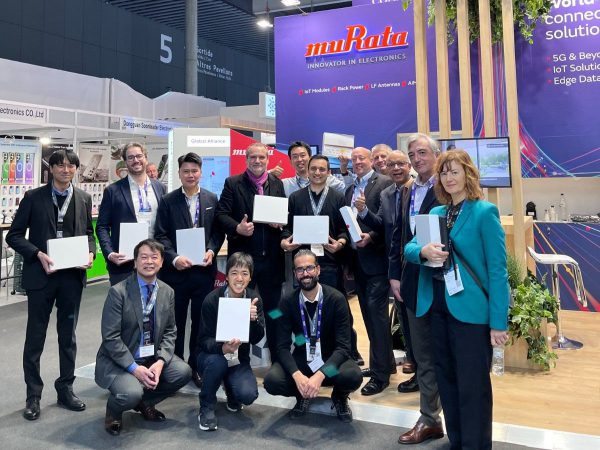
Our SVP for IoT and Enterprise Mobility Alan Yeo (top, third from left) announcing the new IoT alliance with Murata and partners.
Among the BMOs, there were also some exciting IoT announcements. Stc Group forged an alliance with China Mobile International to promote the deployment IoT connectivity services in the Middle East. Stc also inked a Memorandum of Understanding (MoU) with iBASIS that aims to better support IoT and develop the smart device industry. They aim to help IoT developers in Europe and the Americans expand their business in the MENA region, elevate M2M connectivity and also enable international Original Equipment Manufacturers (OEMs) to explore growth opportunities in the MENA region.
China Unicom and Thales inked a memorandum of collaboration to expand their cooperation in the eSIM industry. The longtime partners will enter a next phase to pool resources and technology develop eSIM solutions for IoT, consumer electronics and smart automobiles.
Edge/MEC
On the edge computing front, telcos were showcasing edge computing focusing more on a solution-driven approach to address specific issues. Telkomsel and Singtel are partnering to introduce Indonesia’s first Orchestration Platform for 5G and Edge Cloud Computing, built on Singtel Paragon. The platform will be available through Telkomsel’s Enterprise business unit.
SoftBank announced it has initiated field trials for 5G MEC utilising the Segment Routing IPv6 Mobile User Plane (SRv6 MUP) technology. This technology enables the cost-effective and easy realization of MEC and network slicing.
Keen on another buzzword? “AI at the Edge” which is emerging as a force that can shape the future of connectivity and computing on telco networks. “AI at the edge” will serve network operators, enterprises, consumers for internal use.
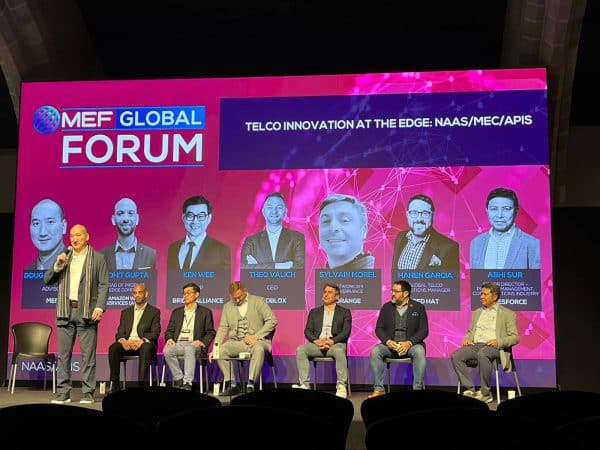
Our SVP for IoT and Enterprise Mobility Alan Yeo (top, third from left) announcing the new IoT alliance with Murata and partners.
5G / AI / Innovation
“5G and Beyond” was one of the themes of MWC 2024, with telcos working hard to use all technologies to unlock capabilities of 5G and bring innovation to all industries. STL Partners expressed it correctly in their MWC 2024 Review Report that “this MWC showed that telcos have moved beyond words and into actions” as most vendors and operators alike were eager to announce their initiatives around 5G and are looking at telco APIs as another step to monetise their 5G investments.
Optus was one of the first operators globally to test the high-capacity wideband multi-operator Ericsson Radio Dot System, ahead of further deployment across the network. When deployed, this system will provide high-capacity 5G connectivity indoors enabling Australian enterprises to drive operational efficiencies. Optus plans to deploy the system at indoor venues such as sporting venues, multi-story buildings and shopping precincts across Australia and use it as a 5G capacity overlay in locations where Optus has already deployed legacy solutions.
Singtel together with Ericsson and Samsung announced the world’s first live implementation of app-based network slicing in February. App owners will be able to activate a dedicated, customised slice of Singtel’s 5G network to boost the performance of their apps and enhance user experience. Previous network slicing technologies were only able to provide a differentiated network experience to subscribers’ lines, but not selected apps.
This quarter Singtel, together with other BMOs, was among the most active with many other announcements: Singtel launched Paragon-S, a digital aggregation and orchestration platform to empower satellite operators to digitally transform; Singtel is launching its GPU-as-a-Service (GPUaaS) in SEA providing enterprises with access to NVIDIA’s AI computing power; Singtel also launched SingVerify, a suite of solutions that authenticates digital identities registered on consumer services or platforms against telco data.
Singtel also partnered with another Singapore operator M1 to enable network-based authentication for Singtel and M1 mobile subscribers through telco APIs, starting with Number Verify and Device Location. As one of the first in the world to collaborate at a national level, the two telcos will work together to federate a suite of APIs that will enable enterprises to access real-time telco network data for authentication and fraud detection.
On the AI front, SoftBank joined other industry leaders like AWS, Arm DeepSig Inc., Ericsson, Microsoft, Nokia, Northeastern University, NVIDIA, Samsung and T-Mobile at MWC24 to launch the AI-RAN Alliance, a new collaborative initiative aimed at integrating AI into cellular technology to further advance radio access network (RAN) technology and mobile networks,
Singtel, SKT, Deutsche Telecom, e& Group and new member SoftBank held the inaugural meeting of the Global Telco AI Alliance (GTAA) at MWC24 and announced their plans to establish a joint venture to develop LLMs specifically tailored to telco needs. SKT, Iceotope Technologies, and SK Enmove are developing liquid cooling solutions to optimize energy-efficiency of AI data centres, including AI-based autonomous cooling systems.
Maxis, meanwhile expanded its strategic collaboration with Google Cloud by integrating GenAI into its workflow and service offerings. They will enable enterprise-grade GenAI within Maxis’ internal and customer service environments, leveraging the Duet AI for Developers platform for AI-powered coding assistance in natural language, and multimodal capabilities from the Gemini models on the Vertex AI platform. Maxis also announced a collaboration with AWS to accelerate innovation n the dynamic fields of genAI and 5G use cases for Malaysian enterprise customers and offer integrated solutions.
In innovation news, Telkomsel Ventures is again holding the Tinc Batch 9 startup accelerator program by establishing a strategic collaboration with AppWorks, a leading venture capital company in Southeast Asia (whose chairman and founder is Taiwan Mobile President Jamie Lin). The programme aims to develop innovative startups so they can provide digital solutions for various sectors in Indonesia. Meanwhile, Singtel is joining Ericsson’s Startup 5G programme, which will help it gain access to ICT research and analytical data from Ericsson’s ConsumerLab and connect with startups that are making headway in areas such as gaming, e-commerce, smart home applications and workplace productivity solutions. In turn, the startups can leverage Singtel’s deep technical expertise and global footprint.
SKT is also expanding its AI-powered veterinary service ‘X Caliber’ globally, by teaming up with Vetology Innovations, a San Diego-based medtech manufacturer and Vieworks, a manufacturer of X-ray medical imaging devices that supplies X-ray detector and medical devices to companies to collaborate on new mutually beneficial business opportunities and solutions.
Singtel has joined the NVIDIA Partner Network Cloud Programme and will bring NVIDIA’s full-stack AI platform to enterprises across the region. Singtel’s NVIDIA-powered AI Cloud will be hosted by Singtel’s Nxera regional data centre business, which will be developing a new generation of sustainable, hyper-connected AI-ready data centres.
Singtel announced that it will augment its maritime digital offerings with Starlink’s satellites to drive adoption of digital solutions by ship owners and operators so they can innovate and tap into advanced technologies to improve safety, operational efficiencies, and crew well-being. With enhanced connectivity and low latency capabilities, ship operators can analyse data in real-time to increase productivity, reduce costs of fuel consumption and operational maintenance, among other benefits. Starlink is the first low Earth orbit (LEO) broadband service to be added to Singtel’s comprehensive portfolio of solutions for vessels.
Gogoro, the firm which developed a battery-swapping platform, is expanding its GoStations in the Philippines following its successful launch through a partnership with Globe’s 917Ventures Inc. and Ayala Corporation.
In a first-of-its-kind collaboration among several of our BMOs, Singtel, AIS, Globe, HKT, Optus, Taiwan Mobile and Telkomsel formed an Alliance to launch a cross-border rewards programme aimed at delivering greater value to eligible customers when they travel to Singapore, Thailand, Philippines, Hong Kong, Australia, Taiwan or Indonesia where the telcos are respectively based. The programme would enable travellers to earn and use rewards and deals in these markets.
The API economy and opening API gateways will accelerate telcos’ shift to become techcos, as service providers and developers leverage APIs to bring new and enhanced digital services and innovation, as our CEO Geok Chwee discussed at a panel discussion at MWC 24.
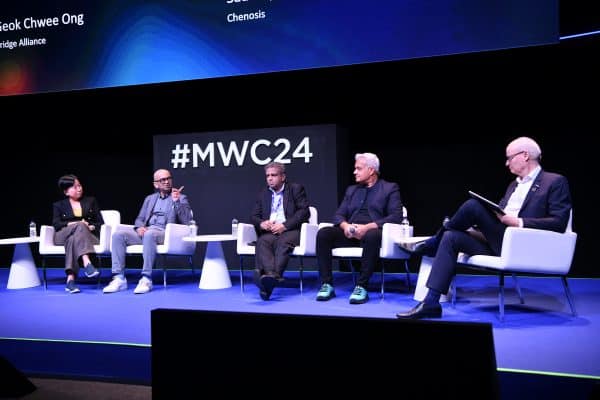
Our CEO Geok Chwee (first from left) at an MWC24 panel on telco APIs.
At MWC, we participated in the GSMA Pavilion Open Gateway demos and outlined our efforts to accelerate telco API exposure, our regional API Exchange proof-of-concept (participants so far are Singtel, Telkomsel, AIS, csl and Maxis) and we also demonstrated Number Verification and SIM Swap API use cases using a partner app from V-Key. Find out more and get in touch if you’re keen to work with us on use cases and embedding APIs in your digital products!
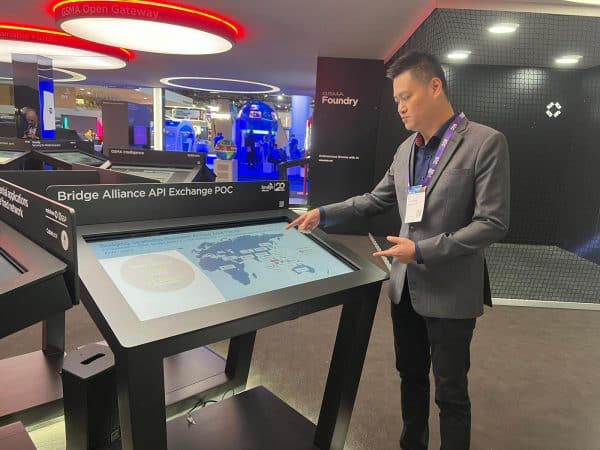
Our colleague Bob Neo, Associate Director Product Management, at our API Exchange PoC at the GSMA Pavilion.
On the APIs front, Telkomsel, together with Indosat Ooredoo Hutchison, XL Axiata, and Smartfren announced the launch of three API services: Number Verify, SIM Swap, and Device Location as part of the GSMA Open Gateway initiative. In Indonesia, Telkomsel and Vonage plan to collaborate to deliver new capabilities to enterprises and end users in the country, leveraging on Telkomsel’s network APIs to accelerate network innovation. Telkomsel has launched Digihub to facilitate access to its APIs for developers and enterprises.
In Thailand, AIS is joining forces with IPification to deliver next-gen phone number verification solutions to acclerate mobile app development through API with partners and developers. Meanwhile, SoftBank conducted a field trial with a common API defined by project CAMARA, aiming to promote the realization of optimal communication control in a 5G environment.
Web3 / Metaverse / Gaming
There are conflicting trends around the Web3 and metaverse, with some companies forging ahead while others have made exits. Meta’s Reality Labs division hit US$1 billion for the first time even though it recorded $4.65 billion in losses! Operators are embracing the live events opportunity – including sports and esports – in a B2B2C model, with private networks and network slicing, often targeting broadcasters.
Among BMOs, stc Bahrain formed a strategic partnership with Lionscraft to build infrastructure for Web3, also marking a significant step in integrating stc Bahrain’s telco capabilities into the blockchain industry. Their signing ceremony was noteworthy in being fully conducted in the metaverse world, setting a precedent for future digital engagements in the region. Additionally, the partnership agreement itself is deployed as an NFT (non-fungible token) on the Avalanche network.
In gaming, Globe Gamer Grounds announced its updated store and rewards portal. Gamers can now top-up using Globe & TM prepaid load and GCash, or redeem points for their favorite games, such as Mobile Legends: Bang Bang, VALORANT, Call of Duty: Mobile, Genshin Impact, Honkai: Star Rail, Ragnarok Origin, and more! The platform is also dedicated to nurturing the grassroots gaming community and continues to organize free tournaments and events.
In Hong Kong, HKT has partnered with Blacknut, a premium game streaming platform, to launch cloud gaming services, allowing customers to enjoy unlimited access to over 500 games from Blacknut on multiple devices simultaneously for a monthly fee. HKT leverages its own low-latency fixed broadband and 5G mobile communication capabilities to support the cloud gaming services, backed by Blacknut’s Cloud Edge technology.
Enterprise
On the enterprise side, telcos are now focused on how to unlock the enterprise opportunity. Diverse moves were made by our BMOs as they focus on monetizing the enterprise business, including security solutions in their offerings.
Singtel signed three MoUs with Cisco, Fortinet, and Nokia, to provide quantum security solutions to enterprises through its Quantum Safe Network (QSN). With this collaboration, enterprises can tap on Cisco’s routing platform, Fortinet’s firewalls and Nokia’s optical devices to boost their defences against advanced cyber threats.
In Malaysia, Maxis and Dell Technologies are collaborating to empower businesses with advanced cybersecurity and innovative enterprise endpoint solutions on 5G. Maxis and Public Bank Bhd will also embark on a joint awareness programme to promote digitalization among SMEs.
Singtel and China Mobile International signed an MoU on connectivity in APAC. They will build connectivity solutions for enterprise customers to bolster business activities in China, Singapore and across Asia.
Optus is focusing on helping recognize trending scams. Through the new feature Optus ScamWise, customers can report a suspicious text by sharing it in the My Optus App. Reported SMS would be analysed by Optus’ scam team; with inauthentic messages blocked to prevent future circulation of that content across the Optus network. The customer reports will also help to inform Optus’ SMS blocking rules.
In India, Airtel, in partnership with IDEMIA Secure Transactions, announced it switched from virgin plastic to recycled PVC SIM cards, in line with Airtel’s commitment to encouraging the adoption of circular business practices.
Unified Communications/CPaaS
CPaaS was in full display at MWC24. Vendors were ingeniously showcasing how CPaaS can be harnessed to create captivating experiences. Focus is transitioning to delivering exceptional user experiences across diverse verticals.
Some of the most significant CPaaS trends to watch this year:
- AI-Powered Customer Engagement;
- Omnichannel/Multichannel Integration;
- Security and Privacy (CPaaS vendors will invest in security and privacy tools or risk upsetting their customers);
- Real-Time Analytics (advanced analytics tools will assist businesses in gaining deeper insights into customer interactions);
- Enhanced Developer Tools (easier for businesses to customize and integrate communication features into their applications/services, leading to a superior customer experience); and
- Global Reach (to facilitate low-cost, local, native-language customer support)
Among our BMOs, SK Telecom introduced a subscription-based AI contact center (SKT AI CCaaS) and an AI Copywriter that automatically generates advertising copy. The cloud-based monthly subscription contact center offers functionalities such as call infrastructure, consultation applications (apps), AI solutions, dedicated lines, consultation personnel, and system operation agency.
Optus announced new solution Optus Loop with RingCentral that will power communications for Australian businesses via an agile, affordable, cloud-based offering for better collaboration and communication.
Meanwhile, Singtel is collaborating with Google to bring Rich Communication Services to businesses in Singapore, which will seamlessly integrate into the native SMS application of Android smart devices and unlock opportunities for businesses across sectors to better engage their customers through an improved, immersive mobile messaging experience.
Cloud
On the cloud front, Stc announced a strategic collaboration with Oracle to deliver cloud solutions tailored for the Saudi Arabian market. stc Group has deployed Oracle Alloy to help organisations leverage hyperscale cloud services while also supporting data residency and data sovereignty.
At MWC24, we at Bridge Alliance inked an agreement with Oracle Singapore which will accelerate BMOs’ access Oracle Cloud Infrastructure (OCI) and its full suite of more than 100 hyperscale cloud services that can be deployed in any of its 48 public cloud regions across 24 countries. This includes the newlyembedded OCI Generative #AI service, a powerful range of pre-built generative AI services and features. BMOs will gain access to these secure, cost-effective, and scalable cloud services for mission-critical workloads, adding value to not only their own operations but also offerings to their enterprise customers. Executed through our very first Regional Collaboration Framework Agreement (RCFA), this partnership aims to lower barriers to entry and drive cost efficiencies for BMOs when procuring Oracle’s services.
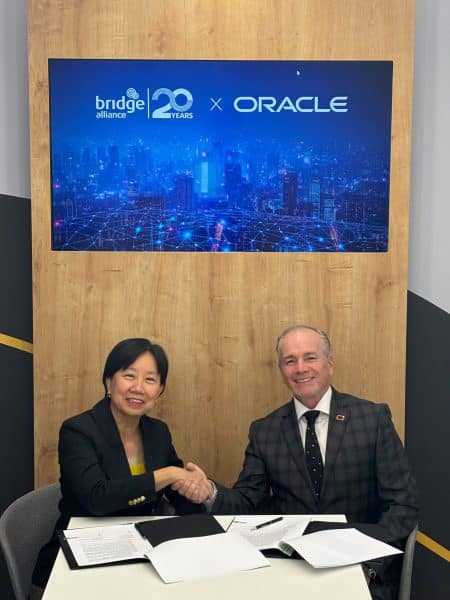
Geok Chwee and Garrett Ilg, President Oracle Japan and Asia Pacific.

